
JAMIA Open
Scope & Guideline
Catalyzing change through accessible health research.
Introduction
Aims and Scopes
- Biomedical Informatics:
Research in this area emphasizes the development and application of informatics solutions to enhance healthcare delivery, clinical decision-making, and patient outcomes. - Machine Learning and AI Applications:
The journal publishes work on using machine learning and artificial intelligence to analyze health data, develop predictive models, and improve clinical workflows. - Health Data Interoperability:
A significant focus is placed on the development of standards and frameworks for the seamless sharing and integration of health data across various platforms. - Patient-Centered Care Technologies:
Research exploring digital health solutions, such as mobile health applications and patient portals, aimed at engaging patients in their healthcare. - Natural Language Processing in Healthcare:
The application of NLP techniques to extract meaningful information from unstructured clinical data, enhancing the usability of electronic health records. - Health Disparities and Social Determinants of Health:
Investigations into how social factors influence health outcomes and the effectiveness of informatics interventions in addressing these disparities.
Trending and Emerging
- Integration of AI in Clinical Practice:
There is a significant increase in research that explores the integration of artificial intelligence into clinical workflows, particularly in predictive analytics and decision support systems. - Patient-Reported Outcomes and Engagement:
Emerging studies focus on utilizing patient-reported outcomes and enhancing patient engagement through digital tools, emphasizing a shift towards more patient-centered approaches. - Telehealth and Remote Monitoring:
The COVID-19 pandemic has accelerated research in telehealth services and remote patient monitoring technologies, reflecting a growing recognition of their effectiveness and necessity. - Federated Learning and Data Privacy:
As concerns about data privacy grow, there is a rising interest in federated learning approaches that allow for the analysis of data across institutions without compromising patient confidentiality. - Behavioral Health Informatics:
There is an emerging focus on the use of informatics to address behavioral health issues, including the development of tools for mental health assessments and interventions.
Declining or Waning
- Traditional EHR Usability Studies:
Research specifically focused on the usability of electronic health records (EHRs) appears to be receiving less emphasis, as the field moves towards more integrated and innovative solutions. - General Healthcare Systems Research:
While still relevant, broad studies on healthcare systems without a specific informatics angle seem to be less common, as the focus shifts to more targeted informatics applications. - Single-Site Studies:
The trend is moving towards multi-site and federated studies that utilize large datasets rather than isolated investigations within single institutions. - Basic Health Data Analytics:
There is a noticeable decline in publications that focus solely on basic data analytics without the integration of advanced technologies like machine learning or AI.
Similar Journals
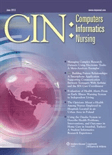
CIN-COMPUTERS INFORMATICS NURSING
Elevating Nursing Practice with Evidence-Based InformaticsCIN-COMPUTERS INFORMATICS NURSING is a distinguished journal that publishes cutting-edge research at the intersection of nursing and information technology. Published by Lippincott Williams & Wilkins, the journal has been a pivotal platform since 2002, catering to the needs of health informatics professionals and nursing researchers. With an impressive impact factor and ranked within Q2 in Nursing (miscellaneous) and other relevant categories, it serves as a key resource for advancing knowledge and best practices in the field. The journal's inclusion in important databases ensures broad visibility and access to the latest findings that influence healthcare delivery. CIN-COMPUTERS INFORMATICS NURSING welcomes a diverse range of articles, including empirical studies, reviews, and innovative methodology approaches, making it an invaluable asset for clinicians, educators, and scholars dedicated to enhancing nursing informatics and improving patient outcomes.
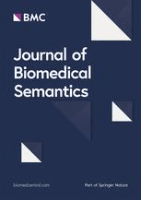
Journal of Biomedical Semantics
Empowering Health Informatics with Semantic PrecisionThe Journal of Biomedical Semantics is a prestigious open-access journal published by BMC since 2010, dedicated to advancing the field of biomedical informatics through the lens of semantics. With an ISSN of 2041-1480, this journal caters to an international audience from its base in the United Kingdom. It focuses on the convergence of computer science, health informatics, and information systems, providing a vital platform for innovative research and knowledge dissemination. The journal is ranked in the second and third quartiles across several relevant categories in 2023, including Q2 in Computer Networks and Communications and Q3 in both Computer Science Applications and Health Informatics. With Scopus rankings highlighting its relevance in various subfields, this journal serves as a critical resource for researchers, professionals, and students alike, promoting high-quality, peer-reviewed articles on topics encompassing advanced computational methods and semantic technologies in healthcare. As a fully open-access resource, it ensures broad accessibility of groundbreaking research findings, making vital contributions to the ever-evolving landscape of biomedical semantics.

BMC Medical Informatics and Decision Making
Driving change in healthcare through informed decision-making.BMC Medical Informatics and Decision Making is a leading journal in the fields of medical informatics and health policy, published by BMC since its inception in 2001. With an impressive impact factor reflecting its status as a Q1 journal in both Computer Science Applications and Health Informatics, it serves as a vital resource for researchers, professionals, and students dedicated to advancing healthcare through informatics. The journal is committed to disseminating high-quality, peer-reviewed research focused on the innovative use of information technology in healthcare, decision-making processes, and policy formulation. As an Open Access platform, it ensures that findings are widely accessible and can foster collaboration across various disciplines. Positioned at the cutting edge of health informatics, BMC Medical Informatics and Decision Making aims to influence practice and inspire new research directions, making it an essential publication for anyone involved in improving health systems worldwide.

Health and Technology
Advancing Healthcare Through Technological InsightsHealth and Technology, published by SPRINGER HEIDELBERG, is a prominent journal in the interdisciplinary realms of health sciences and technology, with a particular focus on the innovative applications of technology in healthcare settings. With a robust ISSN of 2190-7188 and E-ISSN 2190-7196, the journal has been making significant contributions to the field since its inception in 2011. As of 2023, it is recognized within the Q2 category in Applied Microbiology and Biotechnology, Biomedical Engineering, and Biotechnology, alongside a Q3 ranking in Bioengineering, reflecting its ongoing relevance and impact in these dynamic fields. Its commendable Scopus rankings underscore its commitment to high-quality research, being placed favorably among peers: #86 in Biomedical Engineering and #38 in Applied Microbiology and Biotechnology. Although not currently an Open Access journal, Health and Technology offers a wealth of scholarly content that is crucial for researchers, professionals, and students seeking to explore the intersection of health and technological advancements. With a converged publication timeline extending to 2024, the journal remains a vital resource for those striving to push the boundaries of innovation in health technology.
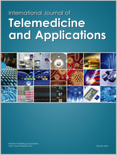
International Journal of Telemedicine and Applications
Advancing knowledge in telemedicine for a healthier tomorrow.International Journal of Telemedicine and Applications is a premier open-access journal published by HINDAWI LTD, focused on the rapidly evolving field of telemedicine and health informatics. With an ISSN of 1687-6415 and E-ISSN of 1687-6423, this journal has been a key resource for researchers, healthcare professionals, and students since its inception in 2007. Based in Egypt, the journal has established a global presence, reflected in its diverse range of articles that cover topics from computer networks to health information management. Its impact is underscored by its impressive rankings in Scopus, including notable positions such as 34th in Health Informatics and 15th in Health Information Management. The journal is classified in Q2 quartiles for four influential categories, showcasing its relevance and contribution to the field. With an ongoing publication timeline from 2008 to 2024, International Journal of Telemedicine and Applications is crucial for advancing knowledge and practice in telemedicine, offering researchers and practitioners the opportunity to explore innovative solutions in healthcare delivery.
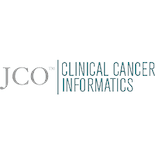
JCO Clinical Cancer Informatics
Advancing cancer care through innovative informatics.Welcome to JCO Clinical Cancer Informatics, an esteemed journal at the forefront of the intersection between oncology and health informatics. Published by Lippincott Williams & Wilkins, this journal is dedicated to advancing the understanding and application of cancer data through innovative informatics solutions. Since its inception in 2017, JCO Clinical Cancer Informatics has established itself as a critical resource for researchers, practitioners, and students, as evidenced by its high rankings in the 2023 Scimago Quartiles—Q2 in Cancer Research and Q1 in both Health Informatics and Oncology. With a commitment to open access, this journal aims to disseminate groundbreaking research findings that enhance cancer care and inform public health strategies. Positioned in the United States, it serves as a pivotal platform for sharing knowledge and fostering collaboration within the global cancer research community.

JOURNAL OF MEDICAL INTERNET RESEARCH
Pioneering Insights in eHealth and TelemedicineJOURNAL OF MEDICAL INTERNET RESEARCH, published by JMIR PUBLICATIONS, INC, stands as a pivotal resource in the field of Health Informatics, with an esteemed ranking of #7 out of 138 in the Scopus database, placing it in the top 95th percentile. Since its inception in 1999, this Open Access journal has been committed to disseminating high-quality, peer-reviewed research that explores the intersection of healthcare and internet technologies. With its headquarters in Toronto, Canada, the journal encompasses a broad range of topics, including eHealth, telemedicine, and mobile health innovations. The impact factor and its Q1 quartile ranking highlight the journal's significant influence and prevalence in advancing the understanding of digital health landscapes. Researchers, professionals, and students alike benefit from its valuable insights, making the JOURNAL OF MEDICAL INTERNET RESEARCH an essential tool for fostering informed practices and policy-making in the rapidly evolving domain of health informatics.
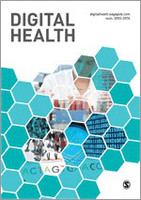
Digital Health
Transforming Health Through Digital Innovation.Digital Health is a pioneering open-access journal published by SAGE Publications Ltd, dedicated to advancing the field of health technology and its intersection with health policy, informatics, and the broader medical landscape. Since its inception in 2015, the journal has rapidly established itself as an essential resource for researchers, professionals, and students, serving as a platform for innovative research that leverages digital tools to improve health outcomes. Currently ranked in the Q2 category across four relevant domains, including Computer Science Applications and Health Informatics, it commands respect within the academic community. With its accessible framework, Digital Health facilitates the dissemination of critical findings and new methodologies that inform policy and practice. The journal’s commitment to open access promotes worldwide access and cooperation, making significant contributions to the evolving landscape of digital health.

JMIR Medical Informatics
Advancing the Future of Healthcare Through InformaticsJMIR Medical Informatics is a leading open access journal dedicated to the field of medical informatics, published by JMIR Publications, Inc. since 2013 in Canada. With an impressive impact factor and a distinguished Q2 ranking in both Health Informatics and Health Information Management categories, this journal plays a pivotal role in disseminating cutting-edge research and innovative practices. Covering a wide scope that includes clinical informatics, health information systems, and data analytics, JMIR Medical Informatics provides valuable insights for researchers, practitioners, and policymakers alike. The journal is accessible to a global audience, ensuring that pioneering studies and methodologies reach those who can apply them to enhance health outcomes. With its commitment to advancing the body of knowledge in medical informatics, this journal stands as a vital resource for anyone involved in or studying the intersection of healthcare and technology.

Journal of Medical Signals & Sensors
Transforming Medical Research with Cutting-Edge InsightsJournal of Medical Signals & Sensors, published by Wolters Kluwer Medknow Publications, is a pioneering platform in the fields of Biomedical Engineering, Computer Science, and Health Informatics, focusing on innovative research and advancements in medical technology. With an Open Access policy since 2012, the journal promotes widespread dissemination of knowledge, aiming to facilitate the sharing of vital insights and developments among researchers, healthcare professionals, and students globally. The journal has achieved commendable rankings in its various categories, including Q3 in Biomedical Engineering and Radiology, underscoring its importance in advancing health technology and informatics. Its commitment to rigorous peer review ensures that published works are of the highest quality, making it a valuable resource for those engaged in cutting-edge medical research. With annual publications planned through 2024, the Journal of Medical Signals & Sensors continues to expand its influence and relevance in a rapidly evolving scientific landscape.